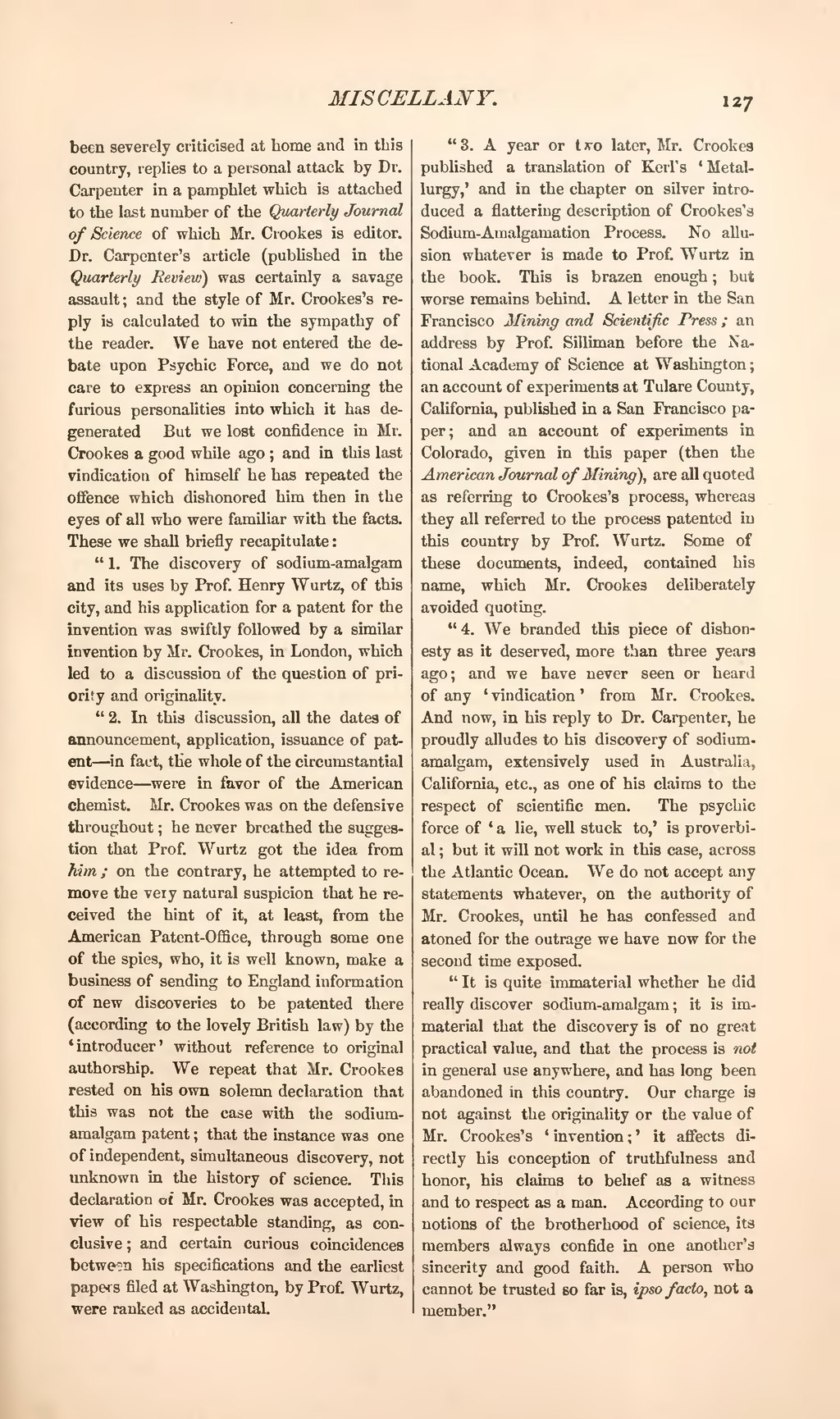been severely criticised at home and in this country, replies to a personal attack by Dr. Carpenter in a pamphlet which is attached to the last number of the Quarterly Journal of Science of which Mr. Crookes is editor. Dr. Carpenter's article (published in the Quarterly Review) was certainly a savage assault; and the style of Mr. Crookes's reply is calculated to win the sympathy of the reader. We have not entered the debate upon Psychic Force, and we do not care to express an opinion concerning the furious personalities into which it has degenerated. But we lost confidence in Mr. Crookes a good while ago; and in this last vindication of himself he has repeated the offence which dishonored him then in the eyes of all who were familiar with the facts. These we shall briefly recapitulate:
"1. The discovery of sodium-amalgam and its uses by Prof. Henry Wurtz, of this city, and his application for a patent for the invention was swiftly followed by a similar invention by Mr. Crookes, in London, which led to a discussion of the question of priority and originality.
"2. In this discussion, all the dates of announcement, application, issuance of patent—in fact, the whole of the circumstantial evidence—were in favor of the American chemist. Mr. Crookes was on the defensive throughout; he never breathed the suggestion that Prof. Wurtz got the idea from him; on the contrary, he attempted to remove the very natural suspicion that he received the hint of it, at least, from the American Patent-Office, through some one of the spies, who, it is well known, make a business of sending to England information of new discoveries to be patented there (according to the lovely British law) by the 'introducer' without reference to original authorship. We repeat that Mr. Crookes rested on his own solemn declaration that this was not the case with the sodium-amalgam patent; that the instance was one of independent, simultaneous discovery, not unknown in the history of science. This declaration of Mr. Crookes was accepted, in view of his respectable standing, as conclusive; and certain curious coincidences between his specifications and the earliest papers filed at Washington, by Prof. Wurtz, were ranked as accidental.
"3. A year or two later, Mr. Crookes published a translation of Kerl's 'Metallurgy,' and in the chapter on silver introduced a flattering description of Crookes's Sodium-Amalgamation Process. No allusion whatever is made to Prof. Wurtz in the book. This is brazen enough; but worse remains behind. A letter in the San Francisco Mining and Scientific Press; an address by Prof. Silliman before the National Academy of Science at Washington; an account of experiments at Tulare County, California, published in a San Francisco paper; and an account of experiments in Colorado, given in this paper (then the American Journal of Mining), are all quoted as referring to Crookes's process, whereas they all referred to the process patented in this country by Prof. Wurtz. Some of these documents, indeed, contained his name, which Mr. Crookes deliberately avoided quoting.
"4. We branded this piece of dishonesty as it deserved, more than three years ago; and we have never seen or heard of any 'vindication' from Mr. Crookes. And now, in his reply to Dr. Carpenter, he proudly alludes to his discovery of sodium-amalgam, extensively used in Australia, California, etc., as one of his claims to the respect of scientific men. The psychic force of 'a lie, well stuck to,' is proverbial; but it will not work in this case, across the Atlantic Ocean. We do not accept any statements whatever, on the authority of Mr. Crookes, until he has confessed and atoned for the outrage we have now for the second time exposed.
"It is quite immaterial whether he did really discover sodium-amalgam; it is immaterial that the discovery is of no great practical value, and that the process is not in general use anywhere, and has long been abandoned in this country. Our charge is not against the originality or the value of Mr. Crookes's 'invention;' it affects directly his conception of truthfulness and honor, his claims to belief as a witness and to respect as a man. According to our notions of the brotherhood of science, its members always confide in one another's sincerity and good faith. A person who cannot be trusted so far is, ipso facto, not a member."
